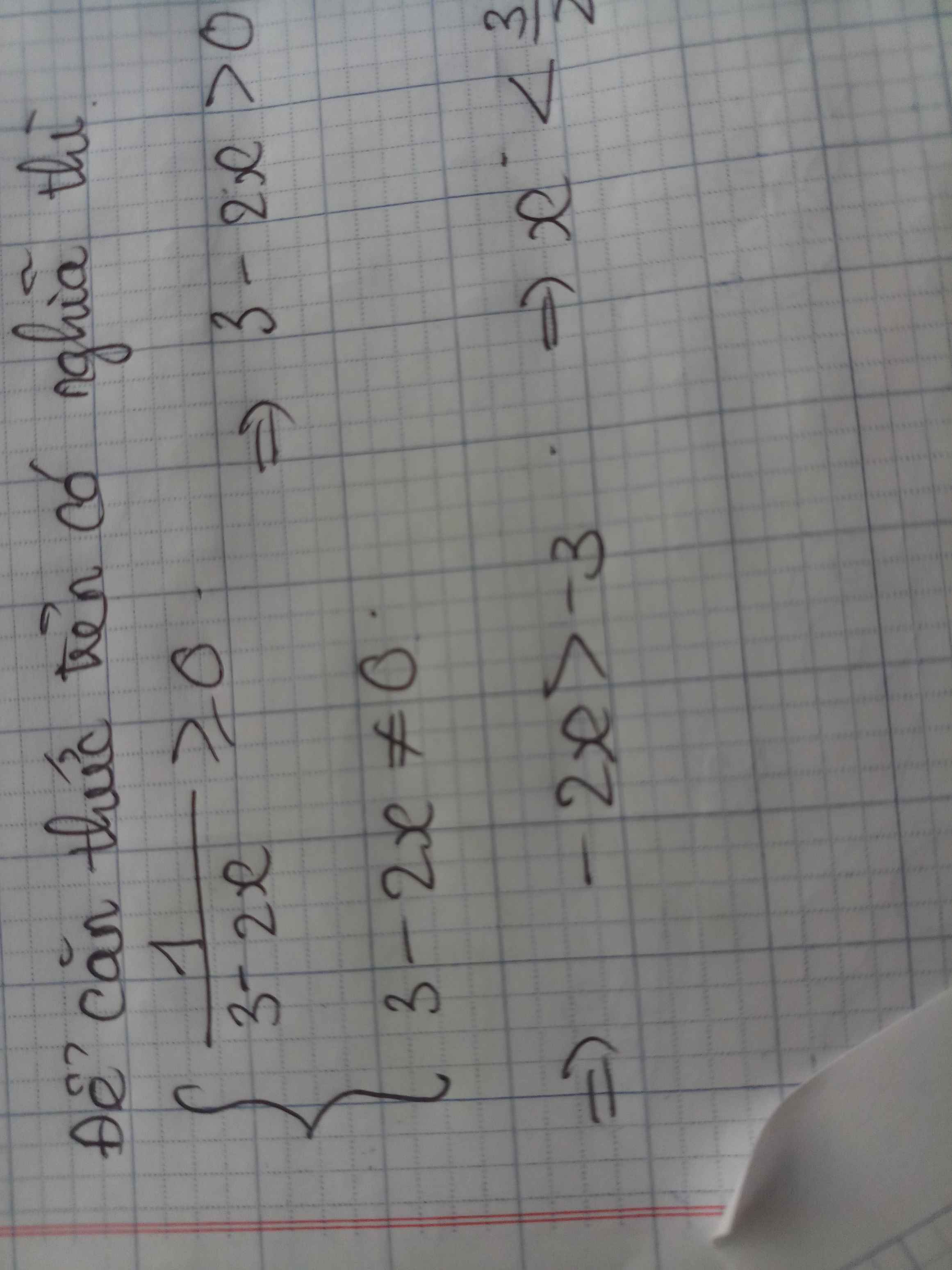Hãy nhập câu hỏi của bạn vào đây, nếu là tài khoản VIP, bạn sẽ được ưu tiên trả lời.

Vd1:
d) Ta có: \(\sqrt{2}\left(x-1\right)-\sqrt{50}=0\)
\(\Leftrightarrow\sqrt{2}\left(x-1-5\right)=0\)
\(\Leftrightarrow x=6\)

Vì `2>0` và `x^{2}>0` ( Với `x\ne0` )
`->(2)/(x^{2})>0`
Vậy với mọi giá trị của `x` thì căn thức đều có nghĩa ( `x\ne0` )

Bài 4:
a, \(\sqrt{3x+4}-\sqrt{2x+1}=\sqrt{x+3}\) (ĐK: \(x\ge\dfrac{-1}{2}\))
\(\Rightarrow\) \(\left(\sqrt{3x+4}-\sqrt{2x+1}\right)^2\) = x + 3
\(\Leftrightarrow\) \(3x+4+2x+1-2\sqrt{\left(3x+4\right)\left(2x+1\right)}=x+3\)
\(\Leftrightarrow\) \(4x+2=2\sqrt{6x^2+11x+4}\)
\(\Leftrightarrow\) \(2x+1=\sqrt{6x^2+11x+4}\)
\(\Rightarrow\) \(4x^2+4x+1=6x^2+11x+4\)
\(\Leftrightarrow\) \(2x^2+7x+3=0\)
\(\Delta=7^2-4.2.3=25\); \(\sqrt{\Delta}=5\)
Vì \(\Delta\) > 0; theo hệ thức Vi-ét ta có:
\(x_1=\dfrac{-7+5}{4}=\dfrac{-1}{2}\)(TM); \(x_2=\dfrac{-7-5}{4}=-3\) (KTM)
Vậy ...
Các phần còn lại bạn làm tương tự nha, phần d bạn chuyển \(-\sqrt{2x+4}\) sang vế trái rồi bình phương 2 vế như bình thường là được
Bài 5:
a, \(\sqrt{x+4\sqrt{x}+4}=5x+2\)
\(\Leftrightarrow\) \(\sqrt{\left(\sqrt{x}+2\right)^2}=5x+2\)
\(\Rightarrow\) \(\sqrt{x}+2=5x+2\)
\(\Leftrightarrow\) \(5x-\sqrt{x}=0\)
\(\Leftrightarrow\) \(\sqrt{x}\left(5\sqrt{x}-1\right)=0\)
\(\Leftrightarrow\) \(\left[{}\begin{matrix}\sqrt{x}=0\\5\sqrt{x}-1=0\end{matrix}\right.\Leftrightarrow\left[{}\begin{matrix}x=0\\x=\dfrac{1}{25}\end{matrix}\right.\)
Vậy ...
Phần b cũng là hằng đẳng thức thôi nha \(\sqrt{x^2-2x+1}=\sqrt{\left(x-1\right)^2}=x-1\); \(\sqrt{x^2+4x+4}=\sqrt{\left(x+2\right)^2}=x+2\) rồi giải như bình thường là xong nha!
VD1:
a, \(\sqrt{2x-1}=\sqrt{2}-1\) (x \(\ge\) \(\dfrac{1}{2}\))
\(\Leftrightarrow\) \(2x-1=\left(\sqrt{2}-1\right)^2\) (Bình phương 2 vế)
\(\Leftrightarrow\) \(2x-1=2-2\sqrt{2}+1\)
\(\Leftrightarrow\) \(2x=4-2\sqrt{2}\)
\(\Leftrightarrow\) \(x=2-\sqrt{2}\) (TM)
Vậy ...
Phần b tương tự nha
c, \(\sqrt{3}x^2-\sqrt{12}=0\)
\(\Leftrightarrow\) \(\sqrt{3}x^2=\sqrt{12}\)
\(\Leftrightarrow\) \(x^2=2\)
\(\Leftrightarrow\) \(x=\pm\sqrt{2}\)
Vậy ...
d, \(\sqrt{2}\left(x-1\right)-\sqrt{50}=0\)
\(\Leftrightarrow\) \(\sqrt{2}\left(x-1\right)=\sqrt{50}\)
\(\Leftrightarrow\) \(x-1=5\)
\(\Leftrightarrow\) \(x=6\)
Vậy ...
VD2:
Phần a dễ r nha (Bình phương 2 vế rồi tìm x như bình thường)
b, \(\sqrt{x^2-x}=\sqrt{3-x}\) (\(x\le3\); \(x^2\ge x\))
\(\Leftrightarrow\) \(x^2-x=3-x\) (Bình phương 2 vế)
\(\Leftrightarrow\) \(x^2=3\)
\(\Leftrightarrow\) \(x=\pm\sqrt{3}\) (TM)
Vậy ...
c, \(\sqrt{2x^2-3}=\sqrt{4x-3}\) (x \(\ge\) \(\dfrac{\sqrt{3}}{2}\))
\(\Leftrightarrow\) \(2x^2-3=4x-3\) (Bình phương 2 vế)
\(\Leftrightarrow\) \(2x^2-4x=0\)
\(\Leftrightarrow\) \(2x\left(x-2\right)=0\)
\(\Leftrightarrow\) \(\left[{}\begin{matrix}2x=0\\x-2=0\end{matrix}\right.\)
\(\Leftrightarrow\) \(\left[{}\begin{matrix}x=0\left(KTM\right)\\x=2\left(TM\right)\end{matrix}\right.\)
Vậy ...
Chúc bn học tốt! (Có gì không biết cứ hỏi mình nha!)

Để \(\sqrt{\dfrac{1}{3-2x}}\) có nghĩa
Khi\(\dfrac{1}{3-2x}\ge0\)
\(\Leftrightarrow3-2x>0\)
\(\Leftrightarrow-2x< -3\)
\(\Leftrightarrow x>\dfrac{3}{2}\)

22,
1, Đặt √(3-√5) = A
=> √2A=√(6-2√5)
=> √2A=√(5-2√5+1)
=> √2A=|√5 -1|
=> A=\(\dfrac{\sqrt{5}-1}{\text{√2}}\)
=> A= \(\dfrac{\sqrt{10}-\sqrt{2}}{2}\)
2, Đặt √(7+3√5) = B
=> √2B=√(14+6√5)
=> √2B=√(9+2√45+5)
=> √2B=|3+√5|
=> B= \(\dfrac{3+\sqrt{5}}{\sqrt{2}}\)
=> B= \(\dfrac{3\sqrt{2}+\sqrt{10}}{2}\)
3,
Đặt √(9+√17) - √(9-√17) -\(\sqrt{2}\)=C
=> √2C=√(18+2√17) - √(18-2√17) -\(2\)
=> √2C=√(17+2√17+1) - √(17-2√17+1) -\(2\)
=> √2C=√17+1- √17+1 -\(2\)
=> √2C=0
=> C=0
26,
|3-2x|=2\(\sqrt{5}\)
TH1: 3-2x ≥ 0 ⇔ x≤\(\dfrac{-3}{2}\)
3-2x=2\(\sqrt{5}\)
-2x=2\(\sqrt{5}\) -3
x=\(\dfrac{3-2\sqrt{5}}{2}\) (KTMĐK)
TH2: 3-2x < 0 ⇔ x>\(\dfrac{-3}{2}\)
3-2x=-2\(\sqrt{5}\)
-2x=-2√5 -3
x=\(\dfrac{3+2\sqrt{5}}{2}\) (TMĐK)
Vậy x=\(\dfrac{3+2\sqrt{5}}{2}\)
2, \(\sqrt{x^2}\)=12 ⇔ |x|=12 ⇔ x=12, -12
3, \(\sqrt{x^2-2x+1}\)=7
⇔ |x-1|=7
TH1: x-1≥0 ⇔ x≥1
x-1=7 ⇔ x=8 (TMĐK)
TH2: x-1<0 ⇔ x<1
x-1=-7 ⇔ x=-6 (TMĐK)
Vậy x=8, -6
4, \(\sqrt{\left(x-1\right)^2}\)=x+3
⇔ |x-1|=x+3
TH1: x-1≥0 ⇔ x≥1
x-1=x+3 ⇔ 0x=4 (KTM)
TH2: x-1<0 ⇔ x<1
x-1=-x-3 ⇔ 2x=-2 ⇔x=-1 (TMĐK)
Vậy x=-1

x+√(x^2+3)=3/(y+√(y^3))=3(y-√(y^2+3)/-a(trục căn thức)
x+√(x^2+3)=-y+√(y^2+3) suy ra x+y=√(y^2+3)-√(x^2+3)(1)
Tương tự,x+y=√(x^2+3)-√(y^2+3)(2)
Cộng (1),(2) theo vế suy ra 2(x+y)=0 suy ra x+y=0
hay E=0.
Vậy E=0
nhân \(-x+\sqrt{x^2+3}\) vào 2 vế ta đc : \(\left(-x^2+x^2+3\right)\left(y+\sqrt{y^2+3}\right)=\)\(3\left(-x+\sqrt{x^2+3}\right)\)
<=> \(y+\sqrt{y^2+3}=-x+\sqrt{x^2+3}\)<=> \(y+\sqrt{y^2+3}+x-\sqrt{x^2+3}=0\)__(1)___
làm tương tự ta đc \(\left(-y+\sqrt{y^2+3}\right)\left(x+\sqrt{x^2+3}\right)\)\(=3\left(-y+\sqrt{y^2+3}\right)\)
<=> \(x+\sqrt{x^2+3}=-y+\sqrt{y^2+3}\)<=> \(x+\sqrt{x^2+3}+y-\sqrt{y^2+3}=0\)__(2)__
lấy (1) + (2) => 2(x+y) =0 => x+y=0
lấy